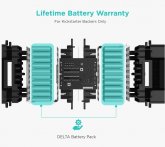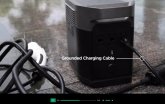NinjaDeathMonk
New Member
- Joined
- Sep 20, 2019
- Messages
- 54
I pledged for a 1300 one just before the Kickstarter ended. I was already a forum member and didn't think until now to see if there was a thread about it.  What convinced me was the price, battery lifetime warranty, the UPS feature, non-proprietary sockets, and that it's not their first device. I think it's a bummer that the UPS feature was an afterthought, because if it's plugged into the wall when the power is down, it could still provide grounding to the connected devices. Yet, there is no ground on the AC sockets.
What convinced me was the price, battery lifetime warranty, the UPS feature, non-proprietary sockets, and that it's not their first device. I think it's a bummer that the UPS feature was an afterthought, because if it's plugged into the wall when the power is down, it could still provide grounding to the connected devices. Yet, there is no ground on the AC sockets.
As for the batteries, they are 18650s but Ecoflow won't specify the cells, arrangement or manufacturer because of an NDA, but they "use a global tier-one supplier ". They do show a diagram of the battery however. I believe it's the pack for the 1000 model made of 3.6Ah cells and arranged in a 10S-8P configuration: 36V x 30.4Ah = 1094.4Wh. If you add two extra parallel rows at 10S-10P, then you get the 1300 model: 36V x 36Ah = 1296Wh. So the difference between the two models may be more like 200Wh instead of 300Wh. But this is all just a guess.
As for the batteries, they are 18650s but Ecoflow won't specify the cells, arrangement or manufacturer because of an NDA, but they "use a global tier-one supplier ". They do show a diagram of the battery however. I believe it's the pack for the 1000 model made of 3.6Ah cells and arranged in a 10S-8P configuration: 36V x 30.4Ah = 1094.4Wh. If you add two extra parallel rows at 10S-10P, then you get the 1300 model: 36V x 36Ah = 1296Wh. So the difference between the two models may be more like 200Wh instead of 300Wh. But this is all just a guess.






